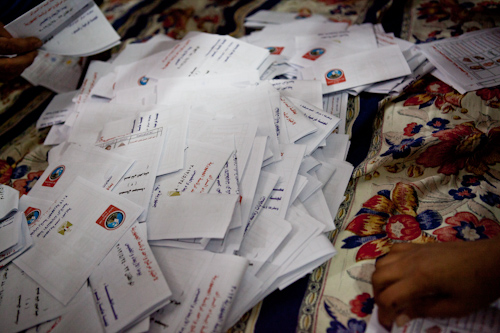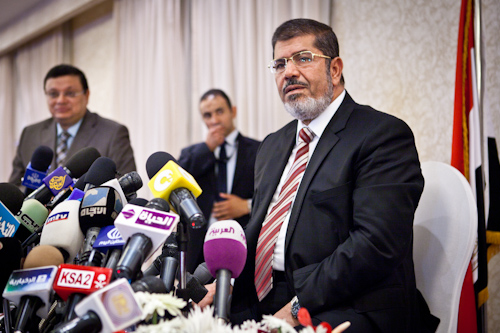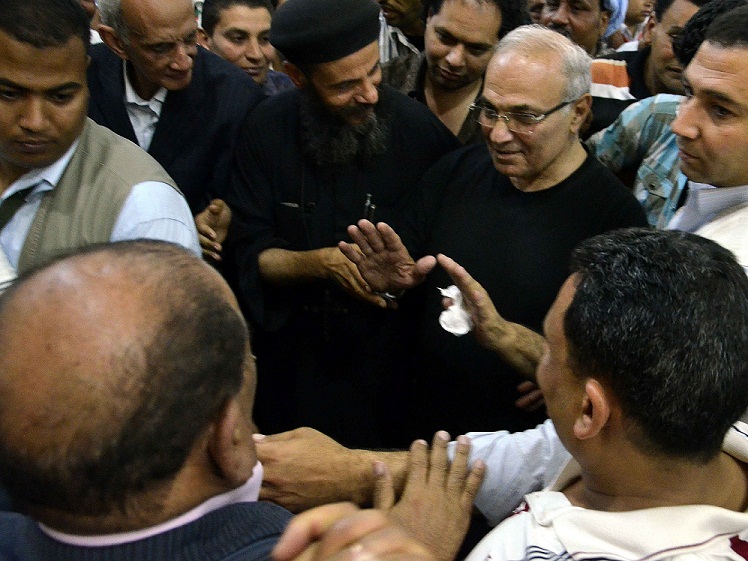
Results from polling stations across Egypt’s 27 governorates began to roll in late Thursday night and early Friday morning following the country’s most competitive presidential poll in history. Voting confirmed analysts' suspicions that only five of the thirteen candidates face the possibility of advancing into a run-off. Those garnering significant support were the Muslim Brotherhood's candidate Mohamed Morsy, Mubarak's last prime minister, Ahmed Shafiq, former Brotherhood leader Abdel Moneim Abouel Fotouh, Nasserist Hamdeen Sabbahi, and the former head of the Arab League, Amr Moussa.
2:45 pm: Abdel Moneim Abouel Fotouh’s campaign has denied reports that the former Brotherhood member conceded and endorsed the Brotherhood’s candidate, Mohamed Morsy, in the runoffs slated for June 16 and 17. The Brotherhood's Freedom and Justice Party earlier announced that it expects Morsy to compete against former Prime Minister Ahmed Shafiq in the runoffs. “Our operations room is following up the counting, which is still ongoing and we have not issued any statements,” Abouel Fotouh’s campaign tweeted. Saudi satellite channel Al-Arabiya had reported Abouel Fotouh as saying he will support Morsy in a runoff against Shafiq.
Al-Masry Al-Youm reports the results of counting in 24 governorates, in which Morsy keeps first place, followed by Shafiq.
"It is clear that the run-off will be between Mohamed Morsy and Ahmed Shafiq," the official told Reuters. The group's governing body was meeting to determine campaign strategy for the run-off, scheduled for June 16 and 17, he said.
The official said that with votes counted from about 12,800 of the roughly 13,100 polling stations, Morsy had 25 percent, Shafiq 23 percent, Abouel Fotouh had 20 percent and Sabbahi 19 percent.
Reuters pointed out that official results are not due to be announced until next week, but representatives of the candidates are allowed to watch the count, enabling them to compile their own tally. It said the vote marks the final step in a messy and often bloody transition to democracy, overseen by a military council that has pledged to hand over power to a new president by 1 July.
9:30 am: Morsy is leading in results that have emerged from the upper Egyptian governorate of Aswan, from Fayoum, 130 km south of Cairo, and from the southwestern governorate of New Valley.
In the most recent aggregation published in Al-Ahram out of 2265 polling stations nation wide (of more than 13,000 polling stations nationwide), Morsy is leading the polls with 25.8 percent of the votes, followed by Shafiq who got 20.6 percent, then Sabbahi, 19.5 percent, former Brotherhood leader Abdel Moneim Abouel Fotouh, 18.2 percent and finally Moussa, 18.2 percent.
The Freedom and Justice Party Facebook page runs a more updated count out of 6661 polling stations, whereby Morsy is still leading by 30.8 percent. The ranking, meanwhile is identical to Al-Ahram's, with Shafiq following (22.3 percent), then Sabbahi (20 percent), then Abouel Fotouh (17 percent), then Moussa (11 percent).
6:30 am: Final results from several governorates are unfolding. The results of all Qena's voting stations have been released. Abouel Fotouh is leading the polls at 26 percent, followed closely by Morsy at 25 percent. Shafiq, Moussa and Sabbahi came third, fourth and fifth at 21 percent, 19 percent and 10 percent respectively.
In the Mediterranean city of Matrouh, Abouel Fotouh leads in the final polling results, with 52 percent of the vote, followed with a big margin by Morsy, who got 11 percent of the votes, and Moussa who won 8 percent. 65,725 of 203,733 eligible voters cast their ballots in Matrouh between Wednesday and Thursday.
According to Al-Ahram, the city of Damietta in Egypt's Delta has witnessed also a victory for Abouel Fotouh, with 106,219 votes, followed by Sabbahi who got 105,877 votes, while Morsy came third at 105,610.
In the upper Egyptian city of Beni Soueif, Morsy led with 260,041 votes, followed by Abouel Fotouh who reaped 121,919 votes, while Shafik got 119,524 votes.
5:30 am: Morsy is leading in many polling stations across the nation. In North Sinai, initial results put him at the lead, with 41 percent of the vote, followed by Moussa, who came in at 22 percent. Former Brotherhood member Abouel Fotouh came third at 19 percent, followed by Shafiq at 10 percent. Morsy's initial victory in North Sinai contradicts expectations of voters' preferences to strongmen of the old regime.
Morsy has also done well in Fayoum, according to the state-run Al-Ahram, where he reaped 46 percent of the votes, followed by Abouel Fotouh at 27 percent. Shafiq came third at 13 percent, Nasserist candidate Sabbahi at 6.5 percent and Moussa at 5 percent. The results come from 286 polling stations out of 380.
Morsy is also leading in Giza, according to Al-Ahram, with some 113,000 votes, followed by Sabbahi who gathered 51,000 votes. Shafik and Abouel Fottouh came third and fourth respectively.
5:00 am: Initial results in the upper Egyptian city of Qena show wide contradictions with initial expectations, particularly in the leading position of the Muslim Brotherhood, for whom the south is not traditionally a stronghold. In Qena, there are about 1.5 million eligible voters. Eight out of the nine polling districts' results have been released.
In Markaz Qena, a mostly rural area, home to 89 polling stations, Morsy led with 12,733 votes followed by Moussa, who came at 11,524 votes. Abouel Fotouh came third with 7,025 votes while Shafiq won only 5,509 votes. Sabbahi came in the fifth place with 3,813 votes. The total number of voters registered at these 89 polling stations is 210,804, out of whom only 42,762 cast their ballots.
In the biggest polling station in the main city of Qena, traditionally a stronghold for the formerly ruling National Democratic Party, Abouel Fotouh's supporters erupted in celebration after initial results were announced. Abouel Fotouh reaped 632 votes, followed by Shafik with 623. Sabbahi came third with 515, Moussa with 361 and Morsy with only 337 votes.
According to local journalists attending the vote counting in different stations in Qena, Abouel Fotouh came second in Farshout, northern Qena, followed by Morsy. He also led the polls in Qus, followed by Moussa and then Morsy. In Waqf, Morsy led instead, followed by Abouel Fottouh and Moussa, while he came second in Abu Tesht, preceded by Moussa. Qeft gavs Moussa another victory as he led the polls of the city with 5027 votes, followed by Abouel Fottouh with 4153 votes, Morsy with 3627 votes, Sabbahi with 2749 and Shafik with 1599 votes. In Naqada, however, Shafik led the polls, followed by Morsy and then Abouel Fottouh. Shafik is also a winner in Nagaa Hammdi, one of Qena's most densely populated areas. He reaped 24,570 votes there, followed by Morsy, who was at 20,389 votes. Abouel Fottouh, Moussa and Sabbahi came next.
4:30 am: Sabbahi is scoring first in several districts, according to initial districts-based results.
According to Al-Masry Al-Youm, in the Dossouq district, Kafr al-Sheikh, from where Sabbahi hails, vote counting has just been sealed. Sabbahi reaped 25,597 votes, followed by Morsy, with 14,517 votes and Moussa, with 1959 votes. Abouel Fottouh is next at 3901 votes and former Prime Minister Ahmad Shafiq is at 3698 votes.
In the East Alexandria district, Sabbahi also led with 43,310 votes, followed by Moussa with 24,343 votes. Abouel Fottouh came third with 21,405 votes and Shafik got 16762 votes, sending Morsy to the fourth rank at 13003 votes. This resonates with Al-Ahram's results from 100 polling stations in Alexandria, out of a total of 691 stations. Sabbahi is confidently leading the polls with 82725 votes, which puts him at 34 percent of the votes. He is followed by Abouel Fottouh, who only comes at 19 percent of the votes though. Morsy and Moussa are next with 17 percent and 15 percent respectively.
Similarly, in the Abdeen district of Cairo, Sabbahi led with 10,051 votes, followed by Shafik with 8056 votes, then Moussa, Abouel Fottouh and Morsy who reaped some 3484 votes.
Initial results from 43 polling stations out of 103 in the coastal city of Port Said show also that Sabbahi is leading with 37,315 votes, followed by Shafik who was at 18,267 votes, then Moussa at 16,641 votes. Morsy came fourth at 14,155 votes and Abouel Fottouh at 12,944 votes. A bigger estimate out of 96 polling stations in Port Said, shows that Sabbahi is still leading at 94,509 votes, followed by Shafiq at 37,440 then Moussa, then Abouel Fottouh.
4:00 am: More major estimates are being released. Al-Ahram, the flagship state-run newspaper, says that based on official tallies of 1,210 polling stations, Morsy has won 414,049, or 35.4 percent of the vote, with Shafiq in second place with 342,556 votes, or 29.3 percent. Abouel Fotouh won 24.3 percent and Sabbahi 18.8 percent, according to Al-Ahram's tally.
Those results roughly track with the estimates of Rassd News, an independent newswire, which announced the results of 3,046 out of the country's 13,000 polling stations. According to Rassd, Morsy is in first place, followed by Shafiq, then Abouel Fotouh, then Sabbahi and finally Moussa. Morsi won 1.38 million votes in these polling stations, well ahead of Shafiq's 867,469.
Results from local polling stations offer insights into voting patterns. In Manshiyet Nasr, Cairo, a poor and heavily Christian area, Shafiq blew his competition out of the water, garnering 1,184 votes, while all the other candidates remained in the double digits at polling station number seven at the Gabarty Primary School. At station number six at the same school, Shafiq did similarly well, with 1,970 votes, while Sabbahi came in second with 86. Nearby, at station 19 in the same Cairo neighborhood, Morsy lead the pack with 602 votes, with Sabbahi coming in next with 552. Abouel Fotouh won 340 there, while Shafiq got 302 and Moussa only 111.
Shafiq has also captured a majority of votes at a polling station at the Othman bin Afnan School in Omraneya, Giza, with 971 votes, followed by Sabbahi with 765. Abouel Fotouh took 614 votes at that polling station and Moussa 547. Morsy, for once, came in last, with 483 votes. In the Fifth Settlement polling station at the Fatma Anan School, Abouel Fotouh did the best, with 942 votes, compared to Shafiq's 895, Morsy's 794, Moussa's 700 and Sabbahi's 693.
3:15 am: As sunrise approaches, larger vote tallies are starting to trickle in from the campaigns
A report issued by the Muslim Brotherhood's Freedom and Justice Party based on the results of 678 polling stations nationwide puts its candidate, Morsy, in first place with 165,874 votes out of 467,717 valid votes.
Morsy is followed in the report by Shafiq with 103,648 votes. Abouel Fotouh comes next with 77,947 votes. Sabbahi, emerging as the dark horse of the elections, comes in fourth in this report with 53,941 votes followed by Moussa, who has come in similar low positions in all preliminary results so far, with 53,181 votes. As he presented the results on television, liberal MP Amr Hamzawy said that they should not be taken for granted since the locations of the polling stations included was not mentioned, which affects the results.
At the same time, Sabbahi's campaign has released its tallies for the city of Mahalla, a major industrial city in the Nile Delta with a large population of laborers, a constituency sympathetic to the Nasserist candidate. According to the campaign, Sabbahi received 85,201 votes there, with Shafiq a distant second with 52,757. Morsy comes in third in the city with 47,346 ballots, followed by Moussa's 39,844. Abouel Fotouh seems to have struck out in the industrial citadel, garnering only 39,125 votes, according to the Sabbahi campaign.
Egypt Independent's correspondent in the city during the voting period predicted that Sabbahi would do well there. However, an election monitor said, "The workers of Mahalla, and Egypt at large, are not united behind a single candidate."
3:00 am: Another substation of Old Cairo's Abul Saoud Prep School saw a turnout of 40 percent, and voters leaned towards Sabbahi. His 886 votes were well ahead of the nearest competitor, Morsy, whom 554 citizens voted for. Abouel Fotouh came in third with 548 votes, while Shafiq earned 370 votes, and Moussa came in fifth with 242.
At Qaba’ School of Medinat Salam, voters also tended to vote for Sabbahi, who won 1,675 votes, beating Morsy’s 1,636. Shafiq was in third with 1,421 votes, and Abouel Fotouh was in fourth with 1,132. Moussa finished fifth with 537.
In the Cairo neighborhood of Sayeda Zeinab, most poll-goers at the Shagaret al-Dor School voted for Sabbahi, giving him 1,680 votes. Shafiq followed with 1,238 votes, Morsy with 808, Moussa with 579, and Abouel Fotouh with 537.
In the informal area of Bulaq al-Dakrur, Sabbahi won 849 votes while Morsy followed closely with 808 votes. Trailing the two candidates was Sabbahi with Abouel Fotouh with 584 votes, Shafiq with 566, and Moussa with 296.
Sabbahi won a landslide victory at a polling station in his home governorate of Kafr al-Sheikh. At the Saad Zaghloul school, he won 1,217 votes, while Abouel Fotouh trailed far behind with 306 votes. Shafiq was in third with 232, while Morsy won 195 votes. Moussa came in fifth with 59 votes.
At stations nine and ten of the Gamal Abdel Nasser School in Manshiyet Nasser, Shafiq came in the lead with 711 votes. Morsy came in second with 648, Sabbahi came in third with 569, Moussa in fourth with 408, and Abouel Fotouh in fifth with 266.
In Ard al-Lewa, Sabbahi’s 2,943 votes were enough to beat Ahmed Shafiq’s 2,133 votes. Sabbahi’s success could be due to the charity that his wife has operated in the area for some 20 years. Morsy came in third with 1,727 votes, while Abouel Fotouh came in fourth with 1,574. Moussa came in last among the front-runners with 945 votes.
2:30 am: Morsy's Freedom and Justice Party (FJP) announced on their Facebook page that they will release their tabulations of 41 percent of polling stations nationwide shortly. Their candidate is currently leading in most tallies of the national vote so far.
The Muslim Brotherhood has issued a press release praising the conduct of the election, but also making note of some violations at polling stations around the country, including unaccounted for ballots and assaults on supporters of the its candidate, Morsy. The Brotherhood also reported that thugs from the former ruling National Democratic Party attacked voters at a polling station in Daqahliya Governorate.
It doesn't appear that these reported violations had much of a negative effect on Morsy.
1:30 am: In Hadiqa Village of Tama, Sohag, Shafiq's 807 votes were well ahead of Mohamed Morsy's 245. Moussa was able to gain the support of 123 voters, while Sabbahi added 54 to his national total and Abouel Fotouh added 112 to his.
At the polling station of the Imam Mohamed Abdu School in the Delta governorate of Qalyubia, Shafiq came out ahead with 627 votes, while Sabbahi followed with 548. Moussa was third with 296 votes, and Abouel Fotouh earned the support of 198 voters. Morsy finished in fifth with 154 votes.
Sabbahi barely counts a victory in the vote count at the Fatima Anan School in Cairo's Fifth Settlement suburb, with 1,062 over Abouel Fotouh’s 1,040. Morsy comes in third with 565, followed by Shafiq with 442 and Moussa with 261.
Votes counted at the Othman bin Afnan School in Sharqiya Governorate also put the Nasserist candidate in the lead with 569 votes followed by Abouel Fotouh’s 317 and then Morsy’s 258, while 242 voters cast their ballots for Shafiq and only 98 voted for Moussa.
In the village of Beba in Beni Suef, a rural governorate just south of Cairo, Morsy dominated the poll, bringing in 598 votes, while his closest competitor, Shafiq, got less than half that at 250 and Abouel Fotouh won 107. Moussa and Sabbahi nearly tied for fourth place, with 38 and 35 votes respectively.
12:30 am: Voters at the Manshiyet Ghali polling station in Sharqiya governorate voted overwhelmingly for Shafiq, with his 422 votes placing him well ahead of his nearest comeptitor, Morsy, who garnered 86 votes. They were followed by Abouel Fotouh, who won 64 votes, Sabbahi with 20 votes, and Amr Moussa with four votes.
However, at the Tahrir School in the Upper Egyptian governorate of Qena, Shafiq was edged out by Abouel Fotouh, who won 492 votes to the former Air Force general's 480. Morsy followed with 285 votes, while Moussa and Sabbahi earned the support of 284 and 261 votes, respectively.
Moussa was the favorite at the Waqsa polling station in Sharqiya, winning 509 votes. Shafiq was next with 295, while Morsy followed with 285, Abouel Fotouh with 81, and Sabbahi with 35 votes.
At another polling station in Sharqiya, in Riyadh, Abu Kebir, Shafiq's 330 votes bested Morsy's 322. Sabbahi and Abouel Fotouh mustered a third of that, with 91 and 89 each, respectively, while Moussa only was able to get 17 votes.
At Abu Dokhan School in Beba, Beni Suef, Morsy and Abouel Fotouh led with 99 and 93 votes, respectively. Moussa was in third with 28 votes, while 26 residents cast their votes for Ahmed Shafiq, and 18 voters chose Moussa.
At Hasim Selim School in Khanka, Qalyubia, Morsy's 158 votes were enough to beat out Shafiq's 97. Abouel Fotouh was able to garner the support of 67 voters, while Moussa's 51 votes and Sabbahi's 45 rounded out fourth and fifth place.
Old Cairo's Abul Saoud Prep School was a much larger polling station, with over 3,500 voters. Most voters opted for secular candidates. Shafiq, with 836 votes was followed by Moussa's 809 votes. Sabbahi earned the votes of 718 poll-goers. The Islamists, Morsy and Abouel Fotouh, won 594 and 551 votes, respectively.
Two voters were enough to push Moussa's 609 votes ahead of Sabbahi's 607 a Medina School in the Dokki Neighborhood of Giza. Shafiq followed with 505 votes, while Abouel Fotouh gained 466 and Morsy was at the bottom of the front-runners with 157 votes.



